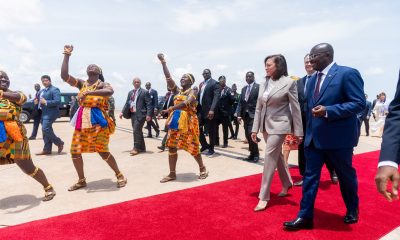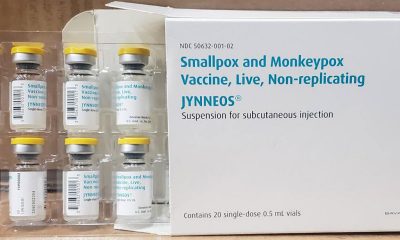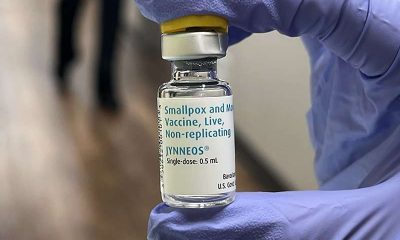Africa
Combating LGBTQ stigma in Africa
Activists share their experiences with the Blade

PRETORIA, South Africa — It is not based on hearsay that most African countries are against the lesbian, gay, bisexual, transgender, queer and intersex among others (LGBTQI+) community primarily because of the cultural beliefs that have been bestowed on them for centuries.
One would ask by whom? Who bestowed these cultural beliefs? Well to be honest that is a question that still has many experts scratching their heads. Some have sighted it is the missionaries who were on an escapade in Africa, preaching and teaching the Gospel of what was right and what was wrong.
Nevertheless, it doesn’t seem to answer the question of stigma wholeheartedly as back in the days, and unfortunately even now, in some African sects if someone gives birth to a person with Albinism or twins stigma automatically follows and at times even death, which is something the missionaries were not in support of but that is another topic for another day that also needs urgent attention today it will be about the LGBTQI+ community.
They are very few countries on the African continent that condone the existence of the LGBTQI+ community, such as South Africa, Mozambique and Angola, among others. However, regardless of it being legalized in those African countries, members of the LGBTQI+ community still continue to receive disparaging comments from the societies they reside in including from family and friends.
In many African communities if you are found to be a member of the LGBTQI+ community, punitive measures are taken which include indoctrination, exorcism and at times even death. To help in understanding why these opprobrious norms are still practiced in Africa I engaged with two LGBTQI+ activists from South Africa, Bruce Walker from Pretoria Pride and Ruth Maseko from Triangle Project and Umndeni.
“We are still staying in a society that takes us as sin or sinners that is why we are always tortured and killed and most of the time before we are killed we are raped because men believe they can make us women by raping us they don’t believe that a woman can love another woman that’s why they always make our lives very difficult,” said Ruth. “As for how we can combat this stigma as a continent? Africa needs more awareness, people need to be educated and taught that there is nothing wrong about same gender love, a man can love a man and a woman can love a woman and in terms of parents who later on find out that their child is gay or a lesbian we need to have parents support groups because some parents end up in shock when they get to figure out that their child is gay or a lesbian so parents need to be sat down with and be educated too.”
In addition, Bruce shared the same sentiment citing various governments throughout the continent need to do more to prevent the stigma that is currently perpetrated towards members of the LGBTQI+ community,
“There are no consequences if someone kills a member of the LGBTQI+ community nothing seems to happen, it is like okay fine it is just a gay person the police seem not to do much about it so we need to raise awareness and educate people that a gay child is just like a straight child there is nothing wrong,” said Bruce. “Us as an organization we try to highlight the injustices against the LGBTQI+ community regardless, we need to stand together as the LGBTQI+ community because if we don’t do that people will continue with these prejudicial acts.”
Nevertheless, communities across the continent are slowly acknowledging the existence of the LGBTQI+ community as more and more people are now coming out of the closet even local celebrities, sports personnel and other influential people are coming out which is kind of having a positive impact on the manner in which members of the LGBTQI+ community are now being perceived but as Ruth and Bruce clearly alluded more still needs to be done to educate and inform people about the matter for the continent to do away with the stigma.
Kenya
Kenyan president defends Trump executive order on two genders
Advocacy groups criticized William Ruto’s Jan. 26 comments

Kenyan President William Ruto is facing backlash for backing U.S. President Donald Trump’s executive order that recognizes only two genders: Male and female.
Ruto’s support for Trump’s decision to ban transgender people from serving in the U.S. military and competing on women’s sports teams has drawn criticism from human rights defenders, lawmakers, lawyers, and intersex activists.
Ruto’s critics cite Kenya’s 2022 landmark decision to officially recognize intersex people as the third gender with an “I” gender marker after years of court battles for recognition and their inclusion in a national Census for the first time in 2019.
“We are very proud that contrary to what has been happening in the past, this year we got some very welcoming developments in the United States that as a leading democracy, we have gotten to understand that the policy direction of the U.S. supports what we believe in,” Ruto stated during a Jan. 26 speech at the Global Cathedral Church’s annual convention in Nairobi. “Boys must remain boys, men must remain men, women must remain women and girls must remain girls.”
Ruto’s position to side with Trump on sex and gender identity contradicts his previous stance during the Biden-Harris administration when he was cautious about speaking about transgender and queer rights in order not to jeopardize his relationship with Washington.
Trump on Jan. 21 signed an executive order that directed the U.S. federal government to only recognize male and female genders. This directive revoked the Biden-era policy that recognized trans rights and allowed trans servicemembers.
Trump on Feb. 6 signed another executive order that bans trans athletes from competing on female sports teams
“The war on women’s sports is over,” he said.
“We’re putting every school receiving taxpayer dollars on notice that if you let men take over women’s sports teams or invade your locker rooms, you will be investigated for violations of Title IX and risk your federal funding,” Trump warned. “From now on, women’s sports will be only for women.”
His executive order relies partly on the U.S. Justice Department’s authority to bring enforcement actions under Title IX, which bars sex discrimination in education and requires schools to offer girls an equal opportunity to play sports. The law, under Trump’s interpretation, forbids trans girls from playing in girls’ sports.
Trump in 2017 banned trans people from serving openly in the U.S. military.
“We thank God that this year the first very news from the U.S. in the new administration is to confirm what the Bible says, what our faith believes in, and what our tradition firmly is grounded on,” Ruto said in his speech.
The Kenya National Commission on Human Rights (KNCHR), a government-funded body, described Ruto’s comments as “embarrassing and unfortunate.”
“In Kenya, the law is very clear and the Children’s Act recognizes the intersex because they are unique persons as they have no issues based on sex identity or gender orientation,” said an intersex rights activist who asked the Washington Blade to remain anonymous. “His sentiments are likely to increase stigma against the intersex persons and if they are discriminated against, anyone will just go to court because they are also protected by the law.”
Esther Passaris, an opposition MP who represents Nairobi County, maintained there are not two sexes in Kenya.
“Let’s face it, we have intersex children with two or incomplete sexes. These children require our love as a society,” she said. “Let God deal with the genders.”
Since the recognition of intersex people, several policy measures to tackle discrimination have been implemented to ensure their protection and equal treatment.
Kenya last week officially recognized intersex people at birth, allowing them to receive birth certificates with an “I” gender marker. The KNCHR described this decision as “a historic milestone” that aligns with the Kenyan constitution and other existing policy measures that include the Children Act and the proposed Intersex Persons Bill, 2024.
“This is a major step towards securing rights, dignity, and equal opportunities for all intersex persons in Kenya,” KNCHR stated.
KNCHR asked Kenyans, state, and non-state institutions to support awareness, policy reforms, and the inclusion of intersex people for the latest reform to be implemented successfully.
Uganda
Ugandan advocacy groups step up fight against mpox
More than 500 new cases reported in country over last two weeks

As mpox cases continue to surge in Uganda, LGBTQ+ rights organizations have raised concerns over its “troubling increase” among the queer community and have advised it to be on high alert.
The Uganda Key Populations Consortium, an LGBTQ+ rights organization, working closely with the Health Ministry and Kampala Capital City Authority and other government bodies to stem the spread of mpox, has warned that queer people in semi-urban areas are the most affected.
“These communities have expressed valid concerns regarding stigma and discrimination which may deter individuals from seeking necessary medical attention,” UKPC Director General Richard Lusimbo said.
Uganda has recorded 512 new mpox cases in the last two weeks, bringing the total number of cases to 2,127 and 12 deaths, as the Health Ministry confirmed on Tuesday. The World Health Organization’s latest multi-country report on the mpox outbreak, released on Jan. 11, indicates that Uganda has recorded 1,552 cases and 12 deaths since the disease was first reported last July..
The WHO report places the capital Kampala with the highest number of mpox diseases spread through community transmission with an infection incidence of 45 cases per 100,000 people, followed by the Wakiso and Nakasongola districts.
“Cases have been reported in at least 49 percent (71 out of 146) of districts in the country, but the epidemic remains largely concentrated in and around Kampala,” the WHO report reads. “So far, only clade Ib MPXV, linked to the outbreak in the eastern Democratic Republic of the Congo, has been detected in the country, and current evidence indicates that transmission of the virus is occurring exclusively through close, physical human-to-human contact.”
People between 20-29 are the most affected group, with sexual contact as a major mode of transmission among sex workers and men who have sex with men.
The UKPC has issued an urgent health advisory to the queer community as it collaborates with the Health Ministry and KCCA in responding to the mpox transmission through immediate and long-term actions, including integrating its response with ongoing HIV prevention and care strategies.
Lusimbo, whose organization has also partnered with WHO and the Most At Risk Populations Initiative, a local health NGO, to stem the spread of mpox stated a unified preventive approach that is inclusive and effective is vital for the health and safety of all Ugandans.
“The fear of stigma and discrimination can exacerbate the situation by hindering effective response and treatment efforts,” Lusimbo said.
He noted that the fight against mpox in Uganda is not just limited to managing a health crisis. It also offers the queer community an opportunity to advocate for the rights and dignity of the marginalized groups.
The UKPC last week unveiled an online survey on the mpox epidemic targeting queer people in Uganda to reliably understand its impact on them and their knowledge about the disease.
“Mpox continues to disproportionately affect mostly our community, especially female sex workers and their clients, and men who have sex with men,” the survey reads. “As the national secretariat and coordinating body for key populations, UKPC, in partnership with KCCA, has been leading important discussions on the disease’s public health implications in areas where the impact is most notable.”
The report states the survey data will help develop tailored, inclusive, and equitable interventions for the LGBTQ+ community. The survey also seeks to provide specific numbers of queer people who have contracted mpox and those who have died from the disease.
Uganda Minority Shelters Consortium Coordinator John Grace attributed the lack of data about queer people affected by mpox to privacy concerns, stigma, and discrimination against the community by the homophobic public and state authorities tasked with enforcing anti-homosexuality laws. He said the Anti-Homosexuality Law has created a significant barrier for queer people to report such abuses.
“This makes it difficult to ascertain the true extent of stigma and discrimination or the impact of misinformation about transmission methods,” Grace said.
Grace also noted the collaboration between LGBTQ+ organizations and healthcare providers in tackling mpox has been “inconsistent.”
“While some providers have been welcoming and supportive, others demonstrate a lack of awareness or sensitivity regarding the specific needs of the LGBTQ+ community,” he said.
Despite the homophobic climate in Uganda amid the fight against mpox, Grace noted many LGBTQ+ organizations have proactively disseminated accurate information to educate queer people about the disease’s prevention within their communities through educational campaigns and safer sex practices.
Ghana
Ghana’s president says anti-LGBTQ+ bill ‘effectively is dead’
Promotion of Proper Human Sexual Rights and Ghanaian Family Values Bill passed in 2024

Advocacy groups in Ghana have welcomed the demise of a bill that would have further criminalized LGBTQ+ people and outlawed allyship.
President John Mahama on Jan. 14 said the Promotion of Proper Human Sexual Rights and Ghanaian Family Values Bill that MP Sam George of Ningo-Prampram co-sponsored in 2021 was essentially dead. Mahama made the remarks to a delegation of bishops from the Ghana Catholic Bishop’s Conference.
“If we are teaching our values in schools, we wouldn’t need to pass a bill to enforce family values,” said Mahama. “More than just passing the Family Values Bill, we need to agree on a curriculum that instills these values in our children as they grow.”
The president also said that although MPs passed the bill last February, parliament dissolved before former President Nana Akufo-Ado, whose term ended earlier this month, signed it.
“I don’t know what the promoters of the bill intend to do, but I think we should have a conversation about it again,” said Mahama. “As far as I know, the bill did not get to the president. So, the convention is that all bills that are not assented to law before the expiration of the life of parliament, expire. So that bill effectively is dead.”
LGBT+ Rights Ghana Communications Director Berinyuy Burinyuy said the president’s remarks offer a glimmer of hope for LGBTQ+ Ghanaians who have long been subjected to systemic discrimination, fear, and violence.
“For many, the mere suggestion that LGBT+ issues could be addressed through education rather than criminalization represents a significant departure from the traditional legislative path championed by the bill’s proponents,” said Burinyuy. “This shift implies a possible opening for dialogue and a more inclusive approach, one that recognizes the need for respect and understanding of diverse sexual identities within Ghanaian society.”
Burinyuy, however, asked about how family values will be incorporated into the educational curriculum.
“Will the curriculum provide a comprehensive, nuanced understanding of human sexuality that respects diversity, or will it risk reinforcing discriminatory attitudes under the guise of cultural preservation?” said Burinyuy. “The fear, particularly among LGBT+ activists is that the emphasis on education could inadvertently foster homophobia in Ghanaian children. If the content is not carefully structured, it could perpetuate harmful stereotypes and deepen existing prejudices.”
“While Mahama may not yet be fully committing to a clear policy direction, his statement leaves open the possibility of a more balanced approach, one that allows for a national conversation on sexual rights without rushing into divisive legislation,” added Burinyuy.
We Are All Ghana said Mahama’s comments are a welcomed approach in addressing anti-LGBTQ+ sentiments and negative stereotyping.
“We need a holistic educational curriculum for our schools,” said We Are All Ghana. “The children at least deserve to know the truth. There is nothing worse than half baked information.”
Yaw Mensah, an LGBTQ+ activist, said Mahama is teaching Ghanaians to be tolerant of everyone, regardless of their sexual orientation.
“Mahama is indirectly saying LGBT persons are not Ghana’s problems. Let’s teach families values that accept and respect everyone. Ghanaian values should be tolerance, respect, honesty, hardworking, hospitality, and integrity,” said Mensah. “Those need to be taught and not the hate, discrimination, barbarism, greediness, and hypocrisy that we are seeing in many leaders which transcends into the young ones.”
George has yet to comment on Mensah’s comments about his bill.
Uganda
Ugandan minister: Western human rights sanctions forced country to join BRICS
President Yoweri Museveni signed Anti-Homosexuality Act in 2023

Ugandan Foreign Affairs Minister Henry Oryem has revealed U.S. and EU sanctions over the country’s Anti-Homosexuality Act and other human rights violations have pushed Kampala to join the BRICS bloc.
Oryem noted Western powers’ decision to sanction other countries without U.N. input is against international norms, and Uganda needed to shield itself from such actions by aligning with the bloc that includes China, Russia, India, South Africa, Brazil, Egypt, the United Arab Emirates, Ethiopia, Iran, and Indonesia. (Consensual same-sex sexual relations remain criminalized in the United Arab Emirates, Egypt, and Ethiopia. Iran is among the countries in which consensual same-sex sexual relations remain punishable by death.)
Kampala officially became a BRICS member on Jan. 1, joining eight other countries whose applications for admission were approved last October during the bloc’s 16th annual summit in Kazan, Russia.
“The United States and European Union, whenever they impose sanctions, expect all those other countries to make sure they abide by those sanctions and if you don’t, you face penalties or even they sanction you,” Oryem said.
Oryem spoke before parliament’s Foreign Affairs Committee on Tuesday.
MPs asked him to explain the circumstances that led Uganda to join BRICS and the country’s financial obligation from the membership.
“Now because of that and the recent events, you have realized that the United States and European Union have started freezing assets of countries in their nations without UN resolutions which is a breach of international world order,” Oryem said. “Uganda can’t just standby and look at these changes and not be part of these changes. It will not be right.”
Oryem also said President Yoweri Museveni’s Cabinet discussed and approved the matter before he directed the Foreign Affairs Ministry to write to the BRICS Secretariat about admitting Uganda into the bloc.
The U.S. and other Western governments condemned Museveni’s decision to sign the Anti-Homosexuality Act, and announced a series of sanctions against Kampala.
Washington, for example, imposed visa restrictions on government officials who championed the Anti-Homosexuality Act, re-evaluated its foreign aid and investment engagement with Uganda, including the President’s Emergency Plan for AIDS Relief (PEPFAR), and reviewed Kampala’s duty-free trade with the U.S. under the African Growth and Opportunity Act for sub-Saharan African countries.
The U.S. in May 2024 imposed sanctions on House Speaker Anita Among and four other senior Ugandan government officials accused of corruption and significant human rights violations.
Although the EU criticized the enactment of the Anti-Homosexuality Act, the 27-member bloc did not sanction Kampala, despite pressure from queer rights activists. The state-funded Uganda Human Rights Commission and several other human rights groups and queer activists, meanwhile, continue to pressure the government to withdraw implementation of the law.
UHRC Chair Mariam Wangadya, who called on the government to decriminalize homosexuality last month, has said her commission has received reports that indicate security officers who enforce the Anti-Homosexuality Act have subjected marginalized communities to discrimination and inhuman and degrading treatment
“As a signatory to several international and regional human rights conventions, Uganda is committed to ensuring non-discrimination and equality before the law,” Wangadya said. “At the domestic level, Uganda’s constitution, under Article 21, prohibits discrimination based on gender, ensuring equality before the law, regardless of sex, race, ethnicity, or social status.”
Museveni’s son comes out against Anti-Homosexuality Act
Museveni’s son, Army Chief General Muhoozi Kainerugaba, has also emerged as a critic of the Anti-Homosexuality Act.
“I was totally shocked and very hurt. Japanese are warriors like us. I respect them very much. I asked them how we were oppressing them. Then they told me about the AHA,” he said on X on Jan. 3 while talking about how the Japanese questioned him over Uganda’s persecution of queer people during his recent visit to Tokyo. “Compatriots, let’s get rid of that small law. Our friends around the world are misunderstanding us.”
Kainerugaba, who is positioning himself as Museveni’s successor, had already declared an interest in running for president in 2026 before he withdrew last September in favor of his 80-year-old father who has been in power for more than three decades.
In his X post, Kainerugaba also indicated that “we shall remove this Anti-Homosexuality Act in 2026.” He left the platform six days later after his posts threatened Uganda’s diplomatic relations.
“They (gays) are sick people, but since the Creator made them … what do we do? Even ‘kiboko’ (whips) might not work. We shall pray for them,” Kainerugaba said.
The Supreme Court is currently considering a case that challenges the Anti-Homosexuality Act. The Constitutional Court last April upheld the law.
Cameroon
Prominent Cameroonian activist faces terrorism charges
Alice Nkom ordered to appear before National Gendarmerie
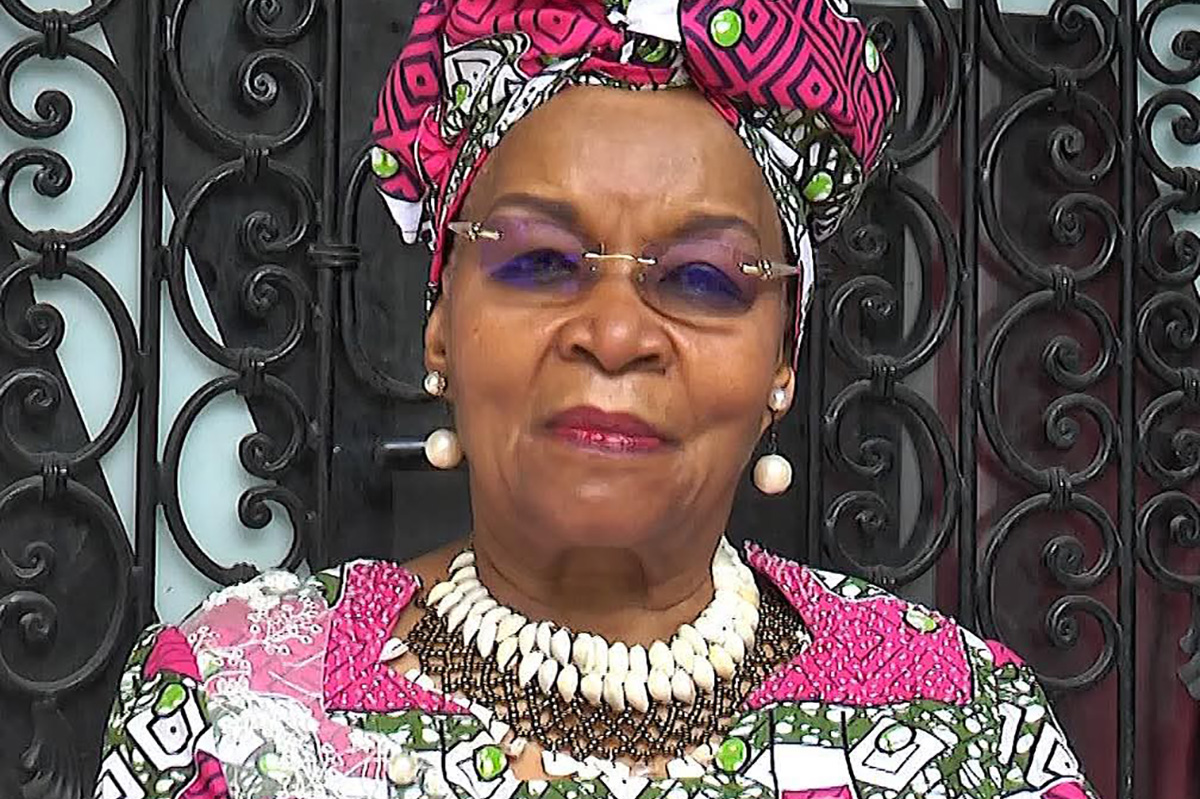
A prominent LGBTQ+ activist in Cameroon is facing terrorism charges.
Alice Nkom, a human rights lawyer and board president of Réseau des Défenseurs des Droits Humains en Afrique Centrale, a group known by the acronym Redhac that translates to Human Rights Defenders Network in Central Africa, on Jan. 2 received a summons from Cameroon’s National Gendarmerie, or national military intelligence.
The summons follows a complaint that Lilian Engoulou, general coordinator of the Observatory for Societal Development, filed.
Engoulou has accused Nkom of attempting to endanger state security, financing terrorism, and funding separatist groups in the northwest and southwest regions of the country that are fighting for independence from Cameroon.
Nkom in recent months has been vocal over the human rights situation in the country, including LGBTQ+ rights.
Territorial Administration Minister Paul Atanga Nji last month suspended Redhac and sealed the organization’s offices for alleged illegal and exorbitant funding and lack of compliance with government regulations on how NGOs should be run.
Nkom, however, removed the seals. This action prompted authorities in Littoral province where Redhoc’s offices are located to issue the summons on Dec. 19 after she did not appear.
Nkom has described the summons as a political witch hunt, stating she doesn’t acknowledge the Observatory for Societal Development. Nkom added she broke the seals because authorities placed them illegally.
“At the beginning of the year, a new summons, this time issued by the police, at the request of the military court, with accusations of financing terrorism, following the complaint of an association that I ignore from its existence, its leaders, or even the date of its creation,” she said.
“Human rights defenders are small, fragile but courageous, against the authoritarian and totalitarian drift of a state,” added Nkom. “Like the dikes facing the rising tide of injustice, they stand there firm, despite their vulnerability. I am an advocate, a human rights defender, a humanist. Humanity cannot be divided into categories. We are one, all connected by the same dignity.”
Maurice Kamto, a fierce critic of President Paul Biya who is a lawyer and leads the opposition Cameroon Renaissance Movement political party, said Nkom should not face judicial and political harassment. Kamto offered to represent her pro bono.
“She is an eminent figure in the public life of our country,” said Kamto. “She is fighting many battles. We do not share all these battles, and it is not all her battles that are at issue today.”
Kamto further described Nkom as “an important voice in the public arena of our country.”
“It is therefore, unacceptable that she should be the object of the judicial and political harassment that the authorities are currently inflicting on her,” said Kamto. “We cannot stand by and watch this happen.”
Consensual same-sex sexual relations are criminalized under Section 347 of Cameroon’s penal code with up to five years in prison. A 2010 law states whoever uses electronic communication devices to make “a sexual proposal to a person of the same sex” faces up to two years in prison.
A number of Cameroonians in recent years have been arrested — and tortured — for engaging in same-sex sexual relations.
A Human Rights Watch report notes Cameroonian security forces between February and April 2021 arrested at least 27 people, including a child, for alleged consensual same-sex conduct or gender nonconformity. Some of those arrested were beaten.
Biya’s daughter, Brenda Biya, last year posted an image to her Instagram page of her kissing her ex-girlfriend, Layyons Valença, and saying her wish was for them to live in peace as a couple. Brenda Biya deleted the post after it sparked controversy in Cameroon.
Nkom is expected to appear before the National Gendarmerie on Jan. 14, which is also her 80th Birthday.
Ghana
Ghanaian Supreme Court dismisses challenges to anti-LGBTQ+ bill
Measure would further criminalize homosexuality, penalize allyship
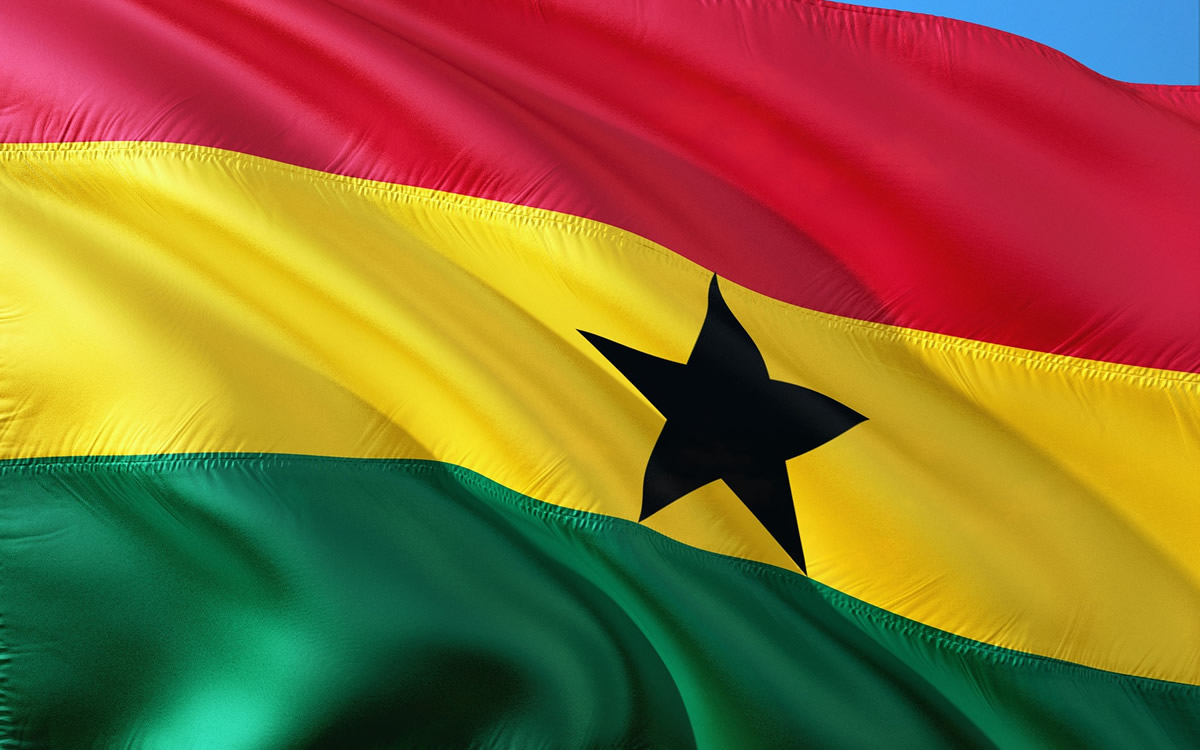
The Ghanaian Supreme Court on Wednesday dismissed challenges to a bill that would further criminalize LGBTQ+ people and penalize allyship.
Lawmakers on Feb. 28 approved the Promotion of Proper Human Sexual Rights and Ghanaian Family Values Bill. Two lawyers, Amanda Odoi and Richard Sky, challenged it.
Outgoing President Nana Akufo-Addo had previously said he would not sign the bill into law until the Supreme Court issued its ruling. His successor, President-elect John Dramani Mahama, will take office on Jan. 7.
Secretary of State Antony Blinken on Dec. 10 honored Ebenezer Peegah, executive director of Rightify Ghana, a Ghanaian LGBTQ+ advocacy group, and six other human rights activists from around the world during a ceremony at the State Department.
Blinken noted the pending Supreme Court ruling — and discrimination and violence that LGBTQ+ Ghanaians continue to face — before he presented Peegah with the Secretary of State’s Human Rights Defender Award.
“In Ghana, vigilante groups use social media platforms to organize mobs to attack LGBTQI+ people, as well as to entrap, to blackmail, to harass them,” said Blinken. “As these attacks increase, Ghana’s Supreme Court is considering legislation that would criminalize people for identifying as LGBTQI+, as well as threaten Ghanaians’ constitutionally protected freedoms of speech, press, and assembly.”
Kenya
Man convicted of killing Kenyan activist, sentenced to 50 years in prison
Edwin Chiloba’s partner murdered him in Eldoret on New Year’s Day in 2023

Kenyan queer rights organizations have welcomed the sentencing of a freelance photographer to 50 years in prison for murdering prominent LGBTQ+ activist and fashion designer Edwin Chiloba nearly two years ago
Justice Reuben Nyakundi on Monday sentenced Jacktone Odhiambo, 25, Chiloba’s partner, after the Eldoret High Court in western Kenya two weeks ago found him guilty of murder.
The 2-year trial, which comprised evidence from 23 witnesses and DNA tests the prosecution presented that placed him at the scene of the crime on New Year’s Day in 2023. Chiloba had disappeared and his body was found stuffed in a metal box that had been dumped along the side of a road.
The court was told that Chiloba and Odhiambo were last seen together at Tamasha Club in Eldoret on the night of Dec. 31, 2022, only for the deceased’s decomposing body to be discovered three days later. His brutal murder sent shockwaves through the LGBTQ+ community in Kenya and attracted both local and international condemnation and calls for the conviction of perpetrators.
Nyakundi in his sentencing ruling noted the prosecution provided evidence beyond a reasonable doubt and described the brutal murder of Chiloba, 25, as “premeditated, malicious, and aggravated homicide.”
“The footprints of the murder are all traceable to the accused (Odhiambo),” Nyakundi said.
The judge noted Odhiambo showed no respect for the sanctity of life and Chiloba’s brutal killing left a void that cannot be filled.
Odhiambo became the prime suspect after three other accused people were freed due to a lack of evidence linking them to the murder.
Johansen Oduor, the government pathologist who conducted Chiloba’s autopsy, told the court during the trial that the victim had been smothered to death using six pairs of socks stuffed into his mouth and his face was wrapped with a piece of denim.
Despite overwhelming evidence linking Odhiambo to the murder, the court noted the accused did not show any remorse for his actions during the trial and described him as a “vengeful person.” This lack of remorse influenced the severity of his 50-year sentence, even though he fell and wailed after the judge sentenced him.
“The accused deserves the death penalty, which is not implemented in Kenya,” Nyakundi ruled.
Kenya’s Office of the Director of Public Prosecutions acknowledged the judge’s verdict, noting the death sentence “would have been unnecessary” because the country has not executed anyone on death row since 1987. The death penalty, however, has not been abolished from Kenyan criminal laws for offenses like murder, robbery with violence, treason, mutiny, and other crimes.
There have been calls by human rights groups, such as the International Commission for Jurists-Kenya, for Kenya to abolish the death penalty. A bill in parliament would repeal the death penalty.
Additionally, Nyakundi could not sentence Odhiambo to life in prison, which the ODPP also noted as “undesirable” because of the uncertainty surrounding offences that constitute a death sentence.
The National Gay and Lesbian Human Rights Commission in response to Odhiambo’s sentencing said it marks a significant step toward justice for Chiloba, his family, and all LGBTQ+ people in Kenya, Africa, and around the world.
“This verdict marks a long-awaited moment of accountability, offering a glimmer of justice for Edwin and a reminder that no act of violence against any LGBTQ+ resident of Kenya will go unchallenged or unchecked,” NGLHRC stated.
NGLHRC also remembered Chiloba as a fondly celebrated, vibrant young queer activist, and budding fashion model whose promising future was robbed from him. NGLHRC added his murder also sent a chilling message of fear and injustice to marginalized queer Kenyans.
“We continue to call on the Kenyan government, law enforcement agencies, and the judiciary to strengthen their commitment to addressing violence against LGBTQ+ residents of Kenya as espoused and guided by Resolution 275 of the African Charter on Human and People Rights,” NGLHRC stated.
The Initiative for Equality and Non-Discrimination, a local queer rights group, acknowledged the court’s 50-year sentence for Odhiambo “deemed appropriate for the gravity of the offense.” INEND also applauded NGLHRC and other queer organizations for “pursuing justice for our sibling Chiloba” in the corridors of justice without relenting.
Ghana
Activists: Ghanaian presidential election results will not improve LGBTQ+ rights
Supreme Court on Dec. 18 to rule on anti-LGBTQ+ law

Former Ghanaian President John Dramani Mahama from the opposition National Democratic Congress has won Saturday’s general elections, defeating current Vice President Mahamudu Bawumia of the New Patriotic Party.
The NDC before the election had pledged its support for the Human Sexual Rights and Family Values Bill, which would further criminalize LGBTQ+ people and those who support them.
The bill, which MPs approved in February, has yet to be signed by outgoing President Nana Akufo-Addo because of a ruling the Supreme Court is expected to issue on Dec. 18. Richard Dela Sky, a journalist and private lawyer, challenged the law in March.
The NDC, NPP and other parties used recognition of LGBTQ+ rights to persuade Ghanaians to vote for them. Mahama during a BBC interview last week said LGBTQ+ rights are against African culture and religious doctrine.
Berinyuy Hans Burinyuy, LGBT+ Rights Ghana’s director for communications, said homophobic attacks and public demonstrations increased during the campaign.
“The passage of the Human Sexual Rights and Family Values Bill into law will institutionalize State-sanctioned discrimination and violence against LGBTQ+ individuals, leaving little to no legal recourse for those affected,” said Burinyuy. “The climate of fear and uncertainty that has gripped Ghana’s LGBTQ+ community cannot be overstated.”
“While the political atmosphere remains hostile, there is still hope that the Supreme Court will rule in favor of human rights and constitutional protections,” added Burinyuy. “Should the court strike down the bill, it will be a significant victory for LGBTQ+ rights and a blow to the growing wave of homophobia that has swept the country.”
Awo Dufie, an intersex person and cross-dresser, said the LGBTQ+ community is going to be at increased risk under the NDC-led government because it supports anti-LGBTQ+ rhetoric.
“Mahama supported the anti-LGBT bill as well as the arrest and prosecution of human rights defenders,” noted Dufie. “Politicizing queer rights as a distraction actually started under Atta Mills (the-late president of Ghana) and the NDC government in 2011, and it was an NDC MP (Sam George) who furthered this in 2021 vocalizing support for the anti-LGBT bill.”
Dufie added Ghanaians “voted out a worse corrupt government who had no respect for human rights, and brought in a former corrupt president who has also promised to not respect human rights.”
Activism Ghana, another LGBTQ+ rights group, said the attacks against LGBTQ+ Ghanaians are a series of political ploys designed to win votes as opposed to accelerating development.
“Hate the gays, win the votes, and when they win and fail to deliver development and prosperity, they scapegoat the gays to take away attention from real problems,” said Activism Ghana.
Secretary of State Antony Blinken on Monday congratulated Mahama’s election, and noted Naana Jane Opoku-Agyemang will become the country’s first female vice president.
“The United States commends the Electoral Commission, its hundreds of thousands of poll workers, civil society, and the country’s security forces, who helped ensure a peaceful and transparent process,” said Blinken in a statement. “We also applaud Vice President Mahamudu Bawumia for his gracious acceptance of the results.”
Mahama’s inauguration will take place on Jan. 7.
Advocacy groups continue to urge Akufo-Addo to veto the Human Sexual Rights and Family Values Bill or amend sections that further criminalize LGBTQ+ people and allies.
South Africa
WorldPride 2028 to take place in Cape Town
South Africa is first African country to host event

Cape Town last month secured enough votes to host WorldPride in 2028.
The bidding process, which started in late October, took place in Medellín, Colombia, where the Guadalajara (Mexico) Pride and WorldPride Cape Town bidding teams contended for the rights to host WorldPride. InterPride, which organizes the event, on Nov. 8 officially declared Cape Town the host of WorldPride 2028.
It will be the first time WorldPride will take place in an African country.
South Africa is the only country on the continent that constitutionally recognizes LGBTQ+ rights. South Africa, as a result, in recent years has seen a surge in the number of LGBTQ+ asylum seekers from Africa and around the world.
Reacting to the historical precedence, Cape Town Pride said it was now time for Africa to shine and acknowledged the WorldPride Cape Town bidding team and the city of Cape Town for their role in the bidding process.
“This is a first for the whole continent of Africa,” said Cape Town Pride CEO Tommy Patterson. “A few weeks ago, in Medellín, Cape Town Pride, the city of Cape Town, and the bidding team presented our bid. The team did a wonderful job and we all forged great friendships and allies from Pride groups all over the globe.”
“Cape Town Pride is thrilled by the news and support shown by the global LGBTI+ family,” added Patterson.
Michael Gladwin of the WorldPride Cape Town bidding team echoed Patterson’s excitement.
“This will mark the first time WorldPride is held on the African continent, and we couldn’t be more excited to welcome the global LGBTQ+ community to our beautiful city,” said Gladwin. “A heartfelt thank you goes out to all our incredible partners who supported this journey. Together, we will showcase Cape Town as a beacon of inclusivity and diversity.”
Gladwin also congratulated Guadalajara Pride for their bid.
“Their commitment in promoting LGBTQ+ rights is inspiring, and we look forward to collaborating in the future,” said Gladwin.
Cape Town’s LGBTQ+ community is celebrating the successful bid, while others in the city have criticized it.
Rev. Oscar Bougardt, founder and lead pastor of the Calvary Hope Baptist Church, described WorldPride as “garbage” and “filth” that should be condemned.
“I am happy to say I am amongst the pastors in Cape Town who are in opposition and are outraged at this garbage planned for 2028,” said Bougardt. “The city of Cape Town and LGBTQ+ organizations planned this event without consulting rate payers, this bid was done in secret and taxpayers’ money will be used to fund this filth.”
“Just as the LGBTQ + organizations have the right to host WorldPride 2028, we have the right to say we don’t want it in Cape Town,” he added. “I pray more church leaders will stand up against the planned WorldPride 2028. To church leaders and parents, this is the time to unite and tell the city of Cape Town and LGBTQ+ organizations that we are disgusted at the planned event. Untied we stand and divided we will fall!”
Kaohsiung, Taiwan, in 2022 won the bid to host WorldPride 2025, but the local planning committee withdrew it amid a dispute with InterPride. WorldPride 2025 will take place in D.C. from May 17-June 8, 2025.
The 2024 ILGA World Conference took place last month in Cape Town.
Uganda
Ugandan court awards $40K to men tortured after arrest for alleged homosexuality
Torture took place in 2020 during COVID-19 lockdown

A Ugandan court on Nov. 22 awarded more than $40,000 (Shs 150 million) to 20 men who police tortured after their 2020 arrest for alleged homosexuality.
The High Court of Uganda’s Civil Division ruling notes “police and other state authorities” arrested the men in Nkokonjeru, a town in central Uganda, on March 29, 2020, and “allegedly tortured.”
“They assert that on the morning of the said date their residence was invaded by a mob, among which were the respondents, that subjected them to all manner of torture because they were practicing homosexuality,” reads the ruling. “The alleged actions of torture include beating, hitting, burning using a hot piece of firewood, undressing, tying, biding, conducting an anal examination, and inflicting other forms of physical, mental, and psychological violence based on the suspicion that they are homosexuals, an allegation they deny.”
The arrests took place shortly after the Ugandan government imposed a lockdown in response to the COVID-19 pandemic.
“Based on the same suspicion (of homosexuality), the applicants were then arrested, taken to Nkokonjeru B police station, and charged with doing a negligent act likely to spread infection by disease,” reads the ruling.
The ruling notes the men “were charged” on March 31, 2020, and sent to prison, “where they were again allegedly beaten, examined, harassed, and subjected to discrimination.”
Consensual same-sex sexual relations remain criminalized in Uganda.
President Yoweri Museveni in 2023 signed the Anti-Homosexuality Act, which contains a death penalty provision for “aggravated homosexuality.” LGBTQ+ activists continue to challenge the law.
Sexual Minorities Uganda Executive Director Frank Mugisha on X described the Nov. 22 ruling as a “significant victory for the LGBTQ+ community.”
-

 Arts & Entertainment5 days ago
Arts & Entertainment5 days agoA Night of legacy, love, and liberation: Inside the 2025 April Fool’s Ball
-

 Movies4 days ago
Movies4 days agoHeartfelt ‘Wedding Banquet’ remake a romcom worth seeing
-

 Brazil4 days ago
Brazil4 days agoUS lists transgender Brazilian congresswoman’s gender as ‘male’ on visa
-

 Arts & Entertainment5 days ago
Arts & Entertainment5 days agoSouth Coast Repertory Theatre hosting world premiere production
-
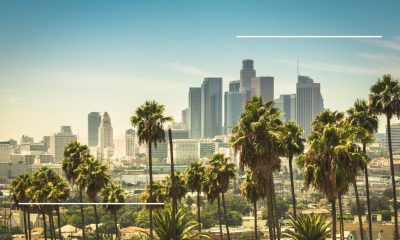
 opinions3 days ago
opinions3 days agoOver 36,000 Angelenos unite for ‘Fighting the Oligarchy’ rally
-

 Books2 days ago
Books2 days ago‘Pronoun Trouble’ reminds us that punctuation matters
-

 Congress3 days ago
Congress3 days agoEXCLUSIVE: Garcia demands answers on deportation of gay Venezuelan asylum seeker
-

 Theater3 days ago
Theater3 days ago‘The Broadway Cage Match’ ready to rumble at WeHo’s Musical Mondays
-

 Features3 days ago
Features3 days agoNew mayor Chelsea Byers, hopes to make WeHo a model city for others to follow
-

 The Vatican3 hours ago
The Vatican3 hours agoPope Francis dies at 88

